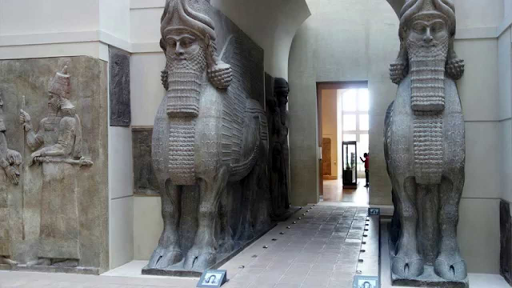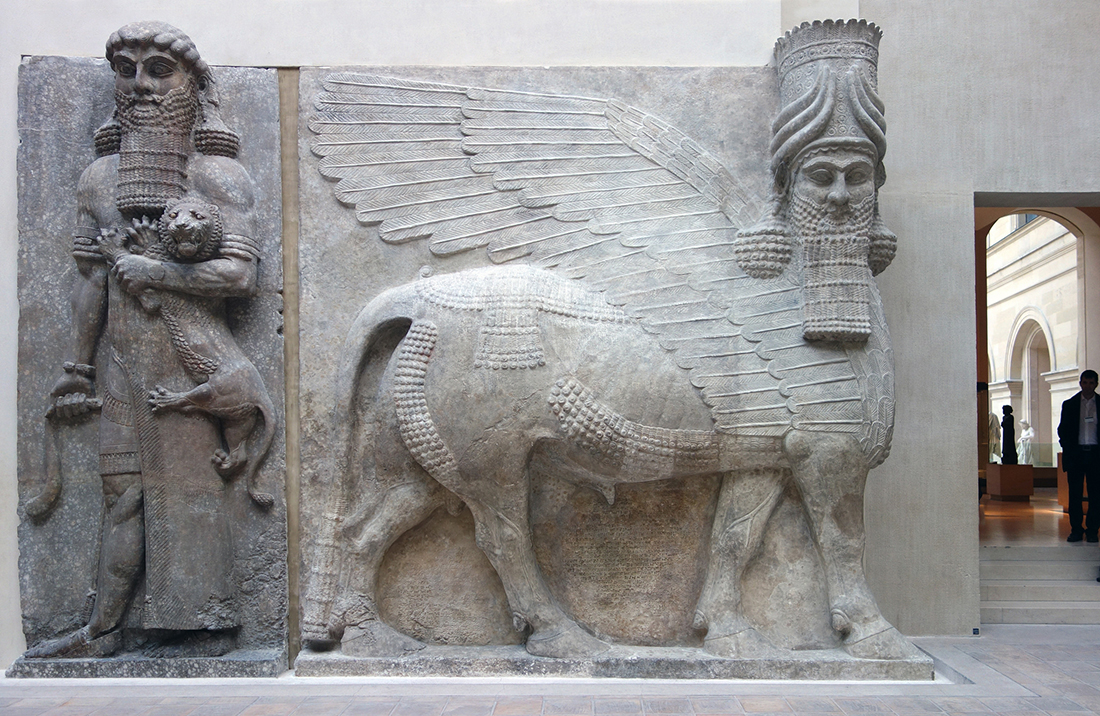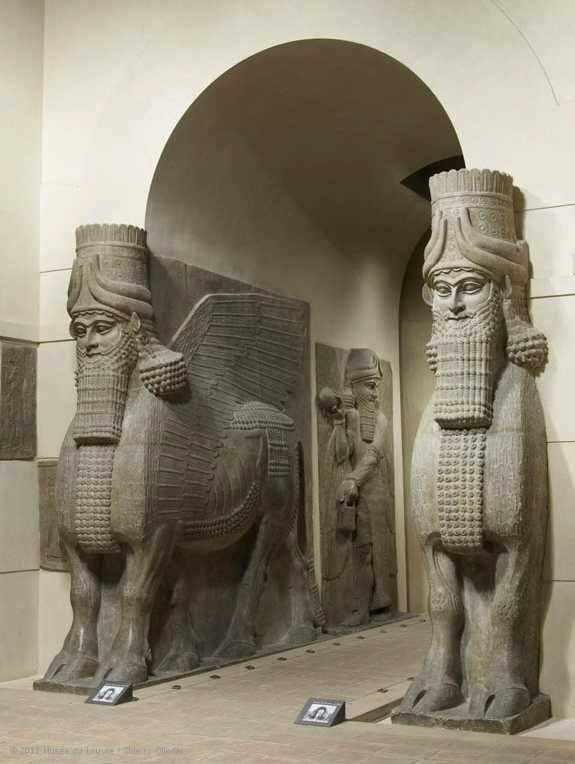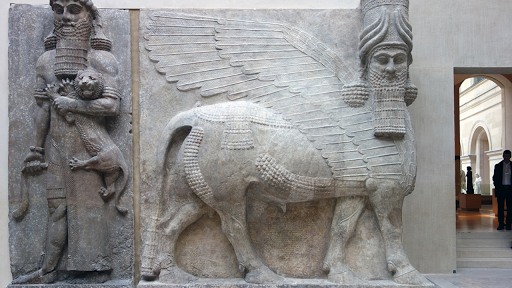Steven Zucker IN THE NEWS. Looking up the lamassu that have been displayed in the.

Lamassu From The Citadel Of Sargon Ii Video Khan Academy
Chicagos bull seems to have been on display undisturbed since 1931.

. The Lamassu sculptures were recovered from where. The oceans provided good drinking water for the population. A Sargons palace b Gudeas Lagash c Ashurbanipals palace d Ziggurat at Ur Which of the following played an important role in the shaping of modern art.
On view at The Met Fifth Avenue in Gallery 401. Sometimes a Lamassu is depicted as a female deity but generally its presented using a more masculine head. The first recorded Lamassu comes from ca.
Lamassu winged human-headed bulls possibly lamassu or shedu from the citadel of Sargon II Dur Sharrukin now Khorsabad Iraq Neo-Assyrian c. The Lamassu sculptures were recovered from where. The female Lamassu were known as apsasu.
Write the first paragraph of your page here. And the lamassu which were thought of as protective deities stood guard either side of an entrance way. Sargons palace Gudeas Lagash Ashurbanipals palace Ziggurat at Ur Which culture is credited with the first system of writing known to humanity.
The ocean was an important source of salt for curing meat. From what we can tell it seems that these sculptures were believed to protect the palace and king from evil supernatural forces as well. These towering creatures were over four meters tall and depicted a beast with the body of a bull or lion the head of a man and the wings of an eagle.
The first change was the capital was moved to Dur Sharrukin present day Khorsabad and second the Lamassu was presented on a bulls body compared to a lions and seems to be slightly smiling. It was used at palace entrances and placed strategically by magicians to protect from evil. The Lamassu served as the symbolic protector of a kings palace and where prominent in Assyrian architecture in the.
Sargons palace Gudeas Lagash Ashurbanipals palace Ziggurat at Ur 1 See answer Advertisement. Human-headed Winged Lion is a raised relief sculpture of a Lamassu with the body of a lion made of gypsum alabaster. What color is lapis lazuli.
The first Lamassu appeared under Tiglath-Pileser in the 900s BCE. We have mentioned the winged bulls or Lamassu and the reliefs coating the walls. Botta 1843-44 Musée du Louvre Speakers.
To protect the household Lamassu were engraved in clay tablets and the tablet would then be buried under the doors threshold. In the Assyrian mythology there were human headed winged bullslions that were protective genies. Irreplaceable Lamassu sculpture Assyrian architecture and.
These buildings generally had only one story. Human-headed winged lion lamassu ca. A replica of Chicagos bull was made and displayed at.
Ashurnasirpal Essay 1619 Words 7 Pages. Lamassu often appear in Mesopotamian mythology and art. It appears frequently in Mesopotamian artThe lamassu and shedu were household protective spirits of the common Assyrian people becoming associated later as royal protectors and were placed as sentinels.
883859 BC undertook a vast building program at Nimrud ancient Kalhu. In Assyrian Lamassu sculptures these creatures were often placed as two sculptures in front of courtyards or palaces. The Ziggurat at Ur was a fortress funerary monument palace temple platform Where were the Lamassu sculptures originally displayed.
Lamassu bull-man Lamassu. Lamassu frequently appear in Mesopotamian art and mythology. 883-612 large monumental bulls often with wings and always with human heads were placed as gateway guardians at the entrances of royal palaces like Khorsabad and Nineveh.
In the chambers of second order these decorative reliefs were replaced alongside a strip of painted stucco with uniform color or polychrome decorations. The Assyrians came first. The Lamassu is a mythical creature present in ancient Assyrian architecture.
In some cases the lamassu statues were accompanied by. The lamassu is a celestial being from ancient Mesopotamian religion bearing a human head bulls body sometimes with the horns and the ears of a bull and wings. The fertile floodplains were good places to grow food.
Sargons palace gudeas lagash ashurbanipals palace ziggurat at ur. Then in April 1991 Michael Bourbon master conservator from Paris arrived in Chicago to create a silicone and plaster cast of the lamassu. Other titles for Lamassu are Lumasi Alad and Shedu.
It comes from Mesopotamia and is believed to be created in ca. The first recorded Lamassu comes from circa 3000 BC. An enormous Winged Lamassu from ancient Assyria at the Palace of Sargon II.
Where were the Lamassu sculptures originally displayed. Furthermore where were the lamassu sculptures originally displayed. This type of image the human-headed winged bull was not unheard of in the Near East and it was quite popular.
What ethnic group is credited with the first system of writing known to man. What were the most common themes in Assyrian art. 720-705 BCE gypseous alabaster 420 x 436 x 097 m excavated by P-E.
Assyrian sculpture typically placed prominent pairs of lamassu at entrances in palaces facing the street and also internal courtyards. It was discovered at the site of ancient Khorsabad around 1930 and dates to the reign of Sargon II 721-705 BC. The great Assyrian king Ashurnasirpal II r.
What ethnic group is credited with the first system of writing known to man. They were represented as double-aspect figures on corners in. Where were the Lamassu sculptures originally displayed.
Beth Harris and Dr. The Lamassu is a celestial being from ancient Mesopotamian religion bearing the head of a man the wings of an eagle and the hulking body of a bull sometimes with the horns and the ears of a bull. The original is located at the Oriental Institute at the University of Chicago.
Where were the lamassu sculptures originally displayed. The palace stood pairs of powerful mythological creatures known as lamassu Gates 170-171. At the gates of the royal palaces the winged bulls seemed to.
Which work has a king approaching the god Shamash. Which work has a king approaching the god. The lamassu of Ashurnasirpals Northwest palace were enormous stone-carved sculptures with the head of a human and displayed animal-like features including the wings of a bird and the body of a bull.
From the ninth to the seventh century BC the kings of Assyria ruled over a vast empire centered in northern Iraq. On a larger scale Lamassu would also flank the entrances of palaces as colossal sculptures in high relief in pairs. It is 3112cm tall 622cm wide 2769cm long which is even larger than the sphinx and is displayed at the Metropolitan Museum with the similar-sized.
Babylonian protective demon with a bulls body eagles wings and a human head. The first image of this hybrid deity emerged during the reign of the King of Assyria Tiglath-Pileser II.

Lamassu Backstory Article Assyrian Khan Academy

25 Lamassu From The Citadel Of Sargon Ii Dur Sharrukin Modern Iraq Ap Art History
Human Headed Winged Bull Lamassu Assyrian Neo Assyrian The Metropolitan Museum Of Art

Lamassu History 2701 Wiki Fandom

Lamassu Symbol For Protection Indrosphere
Colossal Lamassu Sculpture From The Palace Of Sargon Ii At Khorsabad Sargon Ii Google Arts Culture
Human Headed Winged Lion Lamassu Assyrian Neo Assyrian The Metropolitan Museum Of Art

0 comments
Post a Comment